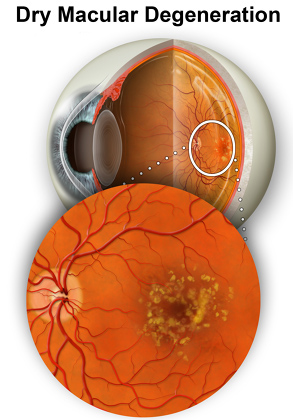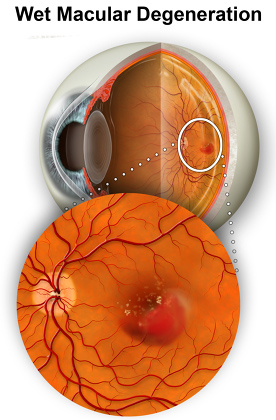Macular Degeneration
About Age Related Macular Degeneration
Age Related Macular Degeneration (ARMD) is a degenerative condition of the Retina in which the central portion of the Retina, called the Macula, is damaged as a result of the hardening of the small arteries supplying oxygen and nutrients to the Retinal tissue. The hardening and narrowing of these arteries deprives the Macula of oxygen and nutrition. This results in a slow but progressive loss of function. The visual effects of Macular Degeneration can be relatively minimal with a mild “dimming” or “distortion” of your central vision, or very profound resulting in a complete loss of your central vision. However, Macular Degeneration DOES NOT cause total blindness. Since the effect of Macular Degeneration is limited to the central Retina, its effects are limited to central vision and thus it does not cause any loss of your peripheral vision.
The Macula is responsible for providing central vision. Central vision is the sharpest or clearest area of your vision and is required for activities such as seeing fine detail of faces, reading and recognizing colors. The Macula provides you with the precise vision required for driving a car and is responsible for central or “straight ahead” vision.
Macular Degeneration is an incurable eye disease and is the leading cause of legal blindness for those aged 55 and older in the United States, affecting more than 10 million Americans in some fashion. Your chances of developing Age Related Macular Degeneration (ARMD) are directly related to your age. The older you are, the greater the chance that Macular Degeneration will affect you.
Types of Age Related Macular Degeneration
There are two main types of Age Related Macular Degeneration:
- “Dry” Macular Degeneration
- “Wet” Macular Degeneration

Dry Macular Degeneration
Dry Macular Degeneration is the most common type of Age Related Macular Degeneration. Dry Macular Degeneration makes up approximately 85-90% of cases of Macular Degeneration. If you have Dry Macular Degeneration, during the examination of your Retina at Riverside Eye Center, Dr. Whitaker will see small, yellow colored deposits between the retinal layers, which are called Drusen. Dry Macular Degeneration results in a slow, gradual progressive “dimming” of your central vision. Many people 50 years of age or older begin to display some Drusen as they age. Drusen are not a problem or a risk to your vision unless they are large or confluent. If you have Drusen, Dr. Whitaker may ask you to schedule eye examinations more frequently in order to monitor them, as there is some possibility that Dry Macular Degeneration will progress to Wet Macular Degeneration over a period of time. Thus people with Dry Macular Degeneration, even without any noticeable change in vision, need to be followed closely as Wet Macular Degeneration has far more serious consequences for vision loss.

Wet Macular Degeneration
Fortunately, Wet Macular Degeneration only accounts for about 10-15% of cases of Macular Degeneration as it is likely to cause far more serious vision loss than Dry Macular Degeneration. Wet Macular Degeneration is characterized by an abnormal growth of new blood vessel under the retina. These new blood vessels are called “neovascularization”. Neovacularization is not made up of “normal” blood vessels in that they are unusually weak in their structure. In fact, they are quite fragile and are prone to be leaky and can easily break and bleed. If leakage occurs, the Macula may actually begin to swell. If the new blood vessels break and bleeding occurs, it can result in scarring as it heals. Scarring of the Macula can cause a sudden, rapid and severe loss of central vision, which is irreversible.
Macular Degeneration is a complex eye disease. Fortunately with early diagnosis it is possible to have a number of treatment options available to help preserve your vision. If you, a family member of friend have not had a recent eye examination or if you feel that you may be at risk for Macular Degeneration, please schedule an appointment with Dr. Whitaker by calling Riverside Eye Center in Norway, Maine at 207.743.0027 or Riverside Eye Center in Lewiston, Maine at 207-786-2500.
Riverside Eye Center is conveniently located for Maine eye care patients in need of examination and treatment of Macular Degeneration from Norway, Lewiston, Rumford, Brunswick, Bath, Augusta, Farmington, Waterville, Madison and Skowhegan, Maine.
